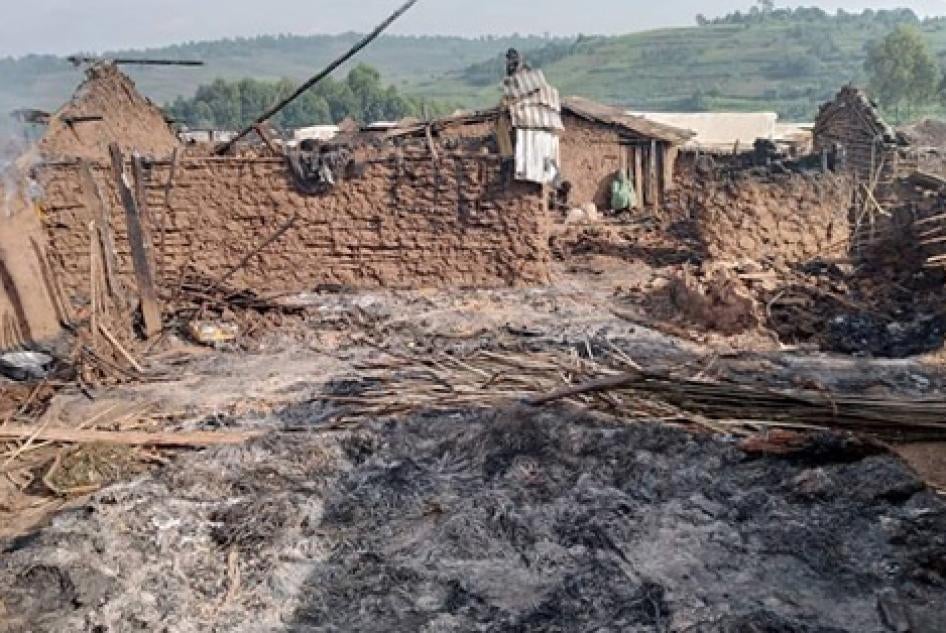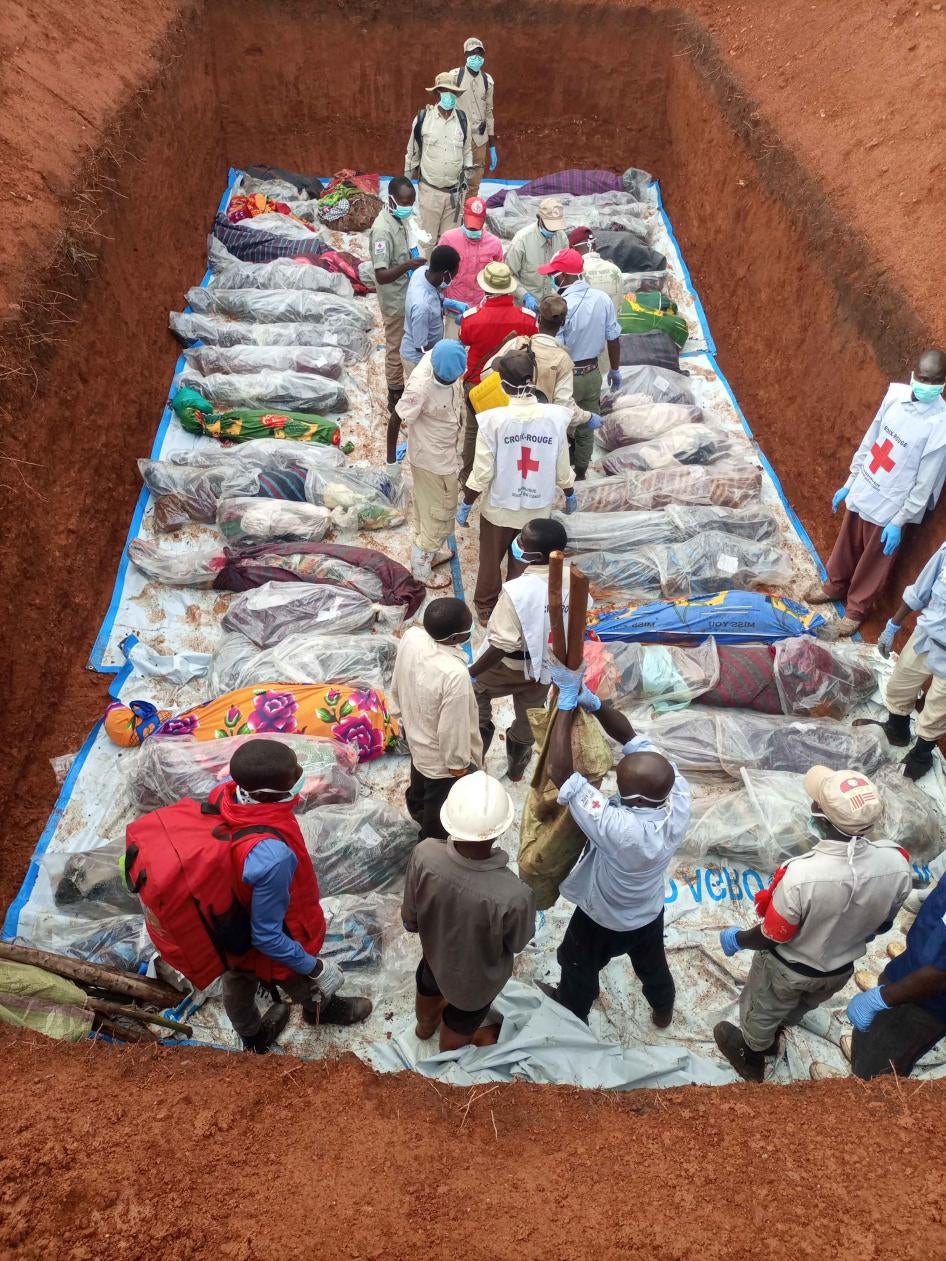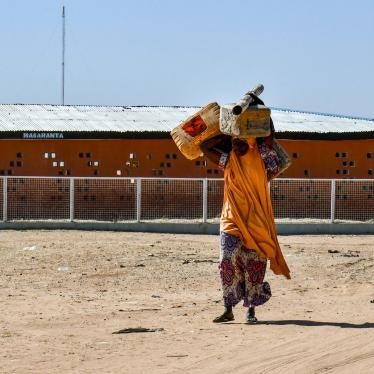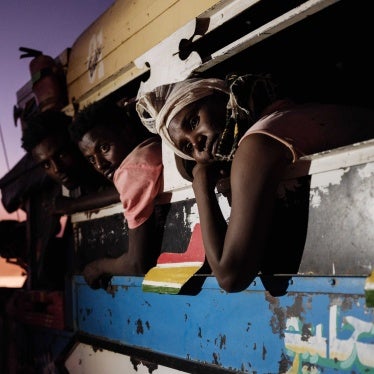(Goma) – Militia fighters killed at least 46 civilians, half of them children, and pillaged and burned a displaced people’s camp on June 12, 2023, in the Democratic Republic of Congo’s eastern Ituri province, Human Rights Watch said today. The Cooperative for the Development of Congo (Coopérative pour le développement du Congo, CODECO), a predominantly ethnic Lendu militia, has repeatedly attacked displaced people’s camps in Ituri over the past two years.
The militia attacked the Lala camp, which was hosting mostly Hema displaced people, at night while most residents were asleep. The fighters shot, hacked to death, or burned 23 children, 13 women, and 10 men, and injured 8 others. Congolese soldiers and United Nations peacekeepers deployed in the nearby town of Bule failed to intervene.
“Attacking civilians in the camps where they seek refuge from violence has become CODECO’s egregious trademark,” said Thomas Fessy, senior Congo researcher at Human Rights Watch. “These camps should be safe havens rather than massacre sites. It’s critical for Congolese forces and UN peacekeepers to enforce their protection mandate to ensure that displaced people are safe and secure.”
The current cycle of violence and reprisal in Ituri, which erupted in December 2017, stems from longstanding issues not addressed since the early 2000s, when tens of thousands of civilians died in massacres between 1999 and 2007. Disputes inherited from colonial-era inequities over land rights and ownership, ethnic relations, meddling by regional powers, and the control of natural resources between communities, particularly between the Hema and Lendu, were a central issue then and continue to be.
Human Rights Watch spoke by phone to nine survivors and witnesses who said they were awakened by the sound of gunfire as fighters attacked the camp.
At about 2 a.m., militiamen entered the southern and northeastern sides of the camp and immediately shot at people’s shelters. They fired on people who ran out of their huts to escape while killing others inside, including some with machetes and knives. Fighters then burned down dozens of huts, including some in which civilians remained. At least 13 charred bodies were found after the attack.
Displaced people and residents of the adjacent village, Lodinga, alerted by phone both the Congolese military and the United Nations Stabilization Mission in Congo (Mission de l'Organisation des Nations Unies pour la stabilisation en République démocratique du Congo, MONUSCO), while the attack was unfolding, but received no help. “There was fire, which could be seen from afar, there was gunfire that they could hear, but they didn’t come,” a 32-year-old Hema man said. A militia fighter hacked the man’s son, 8, to death. “I don’t know what will happen to us if the government leaves us without security in the camp.”
Congolese soldiers staffed a position about 1.5 kilometers away. They entered the camp only after sunrise, once the militia had left, to help gather the dead and wounded.
UN peacekeepers, based about six kilometers away at a base in Bule, could not intervene as one of their armored personnel carriers broke down, the commanding officer, Maj. Imran Tareq, told Human Rights Watch. This prevented them from moving in a convoy of two vehicles as the mission requires.
The UN Department of Peacekeeping Operations (“UN Peacekeeping”) responded by email to a Human Rights Watch query, stating that MONUSCO was conducting an internal investigation into the response to the attack. “If the Mission’s investigation concludes that military personnel did not meet their obligations under the mandate, without any valid reasons, they will face robust disciplinary action,” UN Peacekeeping stated. “On the civilian side, we are also reviewing our early warning system and community alert networks to see where urgent improvements need to be made.”
Two days later, camp residents buried the dead, wrapped in plastic bags, in a mass grave near the camp, except for two who were buried in Lodinga.
As part of the Community Alert Network at Lala camp, the peacekeepers had provided displaced people’s representatives and youth leaders with whistles and phones to alert government forces and UN peacekeepers in case of attacks. The Congolese army spokesperson in Ituri province, Lt. Jules Ngongo, told Human Rights Watch that following the June 12 killings, government troops conducted military operations against armed groups operating in the area and reinforced security around the camp.
MONUSCO’s Major Tareq said the mission’s patrols were increased to up to four within 24 hours for Lala camp alone. Protection strategies for displaced people camps should be urgently overhauled to prevent further attacks and create more responsive warning systems, Human Rights Watch said.
Survivors, medical, and UN sources confirmed that over a month later, in mid-July, several thousand camp residents remain too frightened to stay at the Lala site overnight and prefer to sleep in surrounding villages or in Bule.
Lieutenant Ngongo said the army had opened an investigation. On June 12, the head of MONUSCO, Bintou Keita, condemned the attack which, she said, “constitutes a serious violation of international humanitarian law.” She said the peacekeepers would “support any investigation to determine responsibilities [of the attack] and bring the perpetrators to national or international jurisdictions.”
Congolese authorities should urgently investigate the killings and seek support from the African Union (AU) and the UN, Human Rights Watch said. The special rapporteur for Congo at the African Commission on Human and Peoples’ Rights, in collaboration with other commission special mechanisms, should carry out a fact-finding mission and make their findings public.
At least 945 civilians have been killed in Ituri province since the start of the year, according to data collected by the Kivu Security Tracker, a project jointly run by the Congo Research Group, Human Rights Watch, and the Bridgeway Foundation. Factions of the militia, in particular the main CODECO/URDPC (Union of Revolutionaries for the Defense of the Congolese People, or Union des révolutionnaires pour la défense du peuple congolais in French), have been implicated in nearly half of the killings.
The military rule that the Congolese government imposed in May 2021 has failed to curb widespread violence, and government forces have also been responsible for abuses against civilians. The humanitarian situation in Ituri continues to deteriorate, with more than 1.6 million internally displaced people in the province alone, according to the UN.
CODECO, which claims to protect Lendu interests, emerged in 2017, drawing its name and foundations from a known agricultural cooperative of the late 1970’s. A series of tit-for-tat attacks between Hema and Lendu communities escalated through 2018 with indiscriminate killings, raids on villages, and mass population displacement. As the violence intensified over the last few years, Hema-led factions formed the armed group Zaïre while another militia calling itself the Popular Self-defense Movement of Ituri (Mouvement Populaire d’Autodéfense de l’Ituri, MAPI), also claiming to defend the Hema community, was created in late 2022.
Much of the bloodshed has been fueled by competition over Ituri’s gold mines, which have long been a cash cow for rebels, politicians, and Congolese military officials involved in smuggling gold into neighboring countries. In December 2022, the UN Group of Experts on Congo reported that “CODECO factions and Zaïre continued to fight over, and benefit from, gold exploitation and gold trade,” including by imposing taxes on goods, civilians, and economic actors. They also said that some Congolese army officers collaborated with armed groups and benefited from gold-mining activities.
The June 12 attack took place just days after some of the rival armed groups operating in Ituri’s northeast, including CODECO/URDPC and MAPI, signed a series of commitments for peace, including no longer moving through populated areas with weapons. Despite multiple rounds of talks, including an East Africa Community-led process, Congolese authorities have failed to demobilize and disarm the area’s armed groups.
CODECO’s assault on Lala camp violated the prohibition against attacks on civilians and civilian structures under international humanitarian law. The deliberate killing of civilians and the looting of property amount to war crimes. Commanders responsible for ordering the attack or as a matter of command responsibility should be appropriately prosecuted.
The Congolese government should take steps to ensure that armed groups act in conformity with the 2012 AU Convention for the Protection and Assistance of Internationally Displaced Persons in Africa (Kampala Convention), which states that armed groups are prohibited from “violating the civilian and humanitarian character of the places where internally displaced persons are sheltered and [infiltrating] such places.”
In December 2022, the UN Security Council renewed the mandate of MONUSCO, at the time stressing that “the protection of civilians shall be given priority in decisions about the use of available capacity and resources.” The council directed the mission to pay “particular attention” to civilians gathered in displaced people’s camps like Lala. Unlike other UN peacekeeping operations elsewhere, the mission in the Congo is also tasked with carrying out “effective targeted offensive operations ... to neutralize armed groups.”
“So long as civilians in Ituri believe that nowhere is safe, the Congolese government and UN peacekeepers need to do more to stop the killings,” Fessy said. “But a long-term solution will need government institutions with international support to step up investigations of abuses and prosecute those responsible.”










